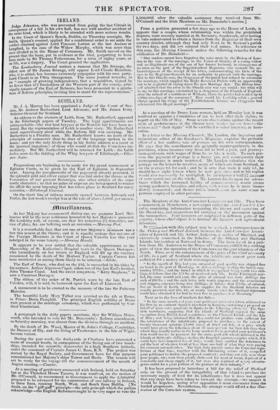The Members of the Anti-Corn-law League are not idle. They
have commenced, in Manchester, a newspaper called the Anti-Corn-bur raw., containing information respecting the history and open:lion of the Bread-tax, and suggestions for earryitmg mu) the movement against the monopolists. Four lecturers are employed in different parts of the ceentry, whose chief object is to instruct the farmers and agricultural labourers.
`.7.-'7.7.eetion with this subject may be netieed, a correspondence in time Orkn,v tutu Sheila nd .Tou rn I, bet w ee n the An t mrn -la w Associ-
ation of Lerwick and Arthur Anderson, a native of Shetland, and.
extensively concerned in the iielmeries of the Orkney and Shetland. Islands. leo resident at Norwood in Sorry. The facts seeed in a peti- tion from .Mr. Anderson to the House of Commene, exhibit in a striking point of' view time operation of the Corn-laws on the poor islanders of the North. First, as to the enhancement of th,? price of the chief necessary of life, in a part of Scotland where the inhabitants cannot grow corn sufficient for a moiety of' their consumption- " In the month of May last year. oatmeal of good quality was shipped free on hoard in the port of Hamburg, at Artre a,11]11:117: terlimmg the barrel, con- tain ng, i 17111 'a. an i d the barrel n which it wa: paeled being worth two shil- lings. it follows that the 171 lbs. of meal cost only 13s. In the Edinburgh mar- ket, the same month and year, the price of oatmeal was forty shillings the sack of280 lbs.; and time sack being only worth sixpence. and the commission and shipping expenses being two shillings, it follows that 171 lbs. of oatmeal, free on board at Leith, whence the supplies for the Shetland fisheries are usually procured, cost 2ds. 4d., or nearly double what the Shetland fisherman could 'have obtained it for had he been free to purchase it at Hamburg."
Next as to the loss of markets for fish-
" In the same month and Year. your petitioner received a letter, addressed to his firm by an eminent Spinii,d, merchant in London, containing a proposal on behalf of some corryspondents in Spain, to the following elect, viz. The Spa- nish merchants, supposing that the Wands id ShetIond enjoyed the same exemption from Brit iii fiscal regulation; as the ('hau:lel Islanas and the hie of Man ; and tieing informed that they could not produce corn sufficient for the subsistenee of the inhabitants, proposed toapcmmorimnimasist„. tit; athiewitt:.settlynitlicohf twenty theusand quintals (1,000 tons) of drie would: have given time fishermen about 3/. more per ton for their fish than that which they usually realize in the home markets for it, rovided your petitioner's firm would mete-ice in payment for the same. good Soft wheat, delivered in the islands at thirtp-firt shillings sterling the Imperial gnarl-on—a price which, if it could have been imported free of dmity. W011hl have enabled the fishermen to eat the hest of wheaten bread at less than one-half of am hat they were paying for common oatmeal cakes. Time high dutv payabl,- under the Corn-law regu- lations at that time, together myith the Atm tutting nature of it, compelled your petitioner tO deC1111e the proposed contract ; and thus not only were these poor people, who were then greatly distressed for .want of bread, deprived of a seasonable and cheap supply of it, bat were also deprived. of a very advanta- geous nutlet for a great portion of the produce of tinir industry."
It has been proposed to introduce a bill for the relief of Shetland wily, on the ground of the incapability of that island to produce the necessary supply of food for its inhabitants ; but it does not appear that any steps have been taken to forward the attempt,—we suspect it would be hopeless, seeing webat opposition it must encounter from the landed proprietors. Nevertheless, the attempt would afford is flue illus- tration of the Corn-law system.


























 Previous page
Previous page